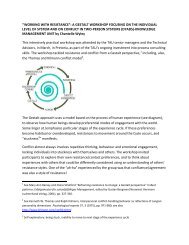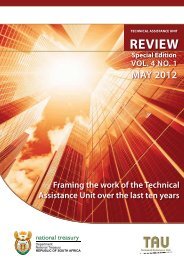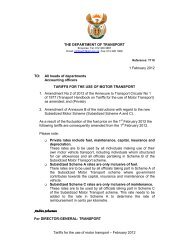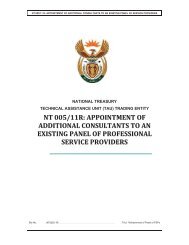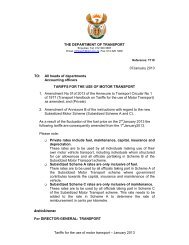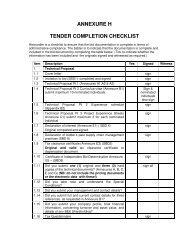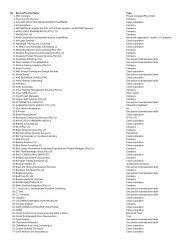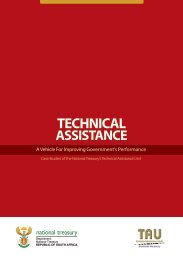Review 3 final 2 - TAU - National Treasury
Review 3 final 2 - TAU - National Treasury
Review 3 final 2 - TAU - National Treasury
You also want an ePaper? Increase the reach of your titles
YUMPU automatically turns print PDFs into web optimized ePapers that Google loves.
TECHNICAL ASSISTANCE UNIT REVIEW | Gender mainstreaming in governance<br />
Conclusion<br />
Theory and current practice points strongly to a new<br />
way of governance and in particular recognition of a<br />
more networked society and therefore policy making<br />
and governance that is typical of a network society.<br />
The developmental trajectory of the various regions<br />
and countries will influence the level of networks to<br />
form and be sustained in those particular societies.<br />
As such, different countries and regions with different<br />
development paths and results will have distinct types<br />
of networks with varying influences on public policy<br />
conversations. As Africa and SADC in particular make<br />
particular choices of the type of governments it wants,<br />
influences of such choices falls into the South African<br />
nation state as our choices also influence them.<br />
Below are some suggestions for bettering South<br />
African governance based on the arguments posed<br />
above. The following is recommended:<br />
• More use of deliberative policy analysis as a means<br />
of understanding governance in the new network<br />
society.<br />
• Policy communities are becoming more and more<br />
conflictual, and therefore more in - depth analysis of<br />
their reasons for conflict and tension is required.<br />
• Social exclusion of vulnerable groups such as<br />
women and children has a large influence on their<br />
ability to govern through their networks. Therefore<br />
it is imperative that governments also assist these<br />
vulnerable groups in accessing discursive policy<br />
arenas and be better networked.<br />
• More work must be done by the South African and<br />
indeed other African governments in dealing with<br />
issues like women’s education, women’s health,<br />
promotion of positive perceptions of women;<br />
gender sensitive data collection techniques and<br />
processes; economic self-determination of women;<br />
valuing of women’s work; placement of women<br />
in decision making positions; educating women<br />
regarding their legal rights and other laws pertinent<br />
to them and gender budgeting; in order for women<br />
to be better able to participate in deliberative policy<br />
processes effectively.<br />
• African Peer <strong>Review</strong> Mechanism recommendations<br />
need to be further implemented.<br />
• Public Service Commission recommendations need<br />
to be further implemented.<br />
Charmaine Williamson<br />
Technical Advisor<br />
References:<br />
African <strong>National</strong> Congress (2007) ANC 52 nd <strong>National</strong> Conference 2007<br />
Resolutions. ANC. Pg 16 and 33.<br />
Morna. C. (2008) SADC Women soar to new heights with Gender<br />
Protocol, in Gender Media and Diversity Journal, Issue 5. Pg 10.<br />
Open Society Initiative for Southern Africa (2010) The African Peer<br />
<strong>Review</strong> Mechanism: A compilation of studies of the process in nine<br />
African countries. Open Society Foundation.<br />
Republic of South Africa: Public Service Commission. (2009): State of<br />
the Public Service Report.<br />
Quan-Baffour K.P (2008) Gender mainstreaming: A new paradigm for<br />
sustainable environmental management in Ghana. Africanus: Journal<br />
of Development Studies, 38 (1) Pg 57-62<br />
Republic of South Africa (RSA) Gender Mainstreaming initiatives in the<br />
Public Service. November 2006. Public Service Commission. Pretoria.<br />
Government Printer. Pg 70- 76.<br />
Todes .A, Sithole .P and Williams .A (2007) Local government, gender<br />
and integrated development planning. Human Sciences Research<br />
Council Press. Pretoria: Pg 9-33.<br />
Wood Wetzel, J (1996) On the road to Beijing: the evolution of the<br />
international women’s movement. Afflia: Journal of Women and Social<br />
Work, 11 (22) Pg 221-236.<br />
page 29<br />
Enabling change for development



